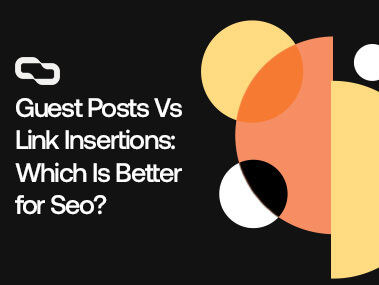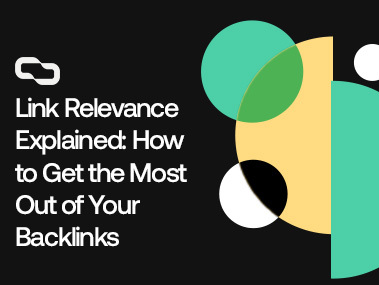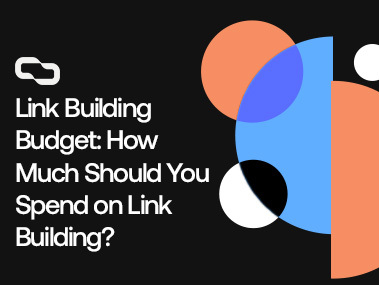Contextual Links — What Are They and How Can They Boost Search Traffic?
When it comes to web content, the user is king.
Contextual links are a user-centric approach to enhance their web experience — which is exactly what Google wants you to do.
I've been building contextual links that Google loves for over 5 years now.
And in this guide, I'll walk you step by step to unravel the concept of contextual links, shedding light on their definition, types, and role in boosting search traffic.
Key Takeaways
- Contextual links are hyperlinks relevant to web content, enhancing the reader's experience.
- They are vital for SEO, indicating content quality and boosting search rankings.
- Types include external, internal, and inbound links, serving unique purposes.
- Acquisition strategies include creating link-worthy content, establishing authority, outreach, broken link building, interviews/podcasts, and guest article contributions.
What Are Contextual Links?
Contextual links are hyperlinks embedded within the content of a webpage that are directly relevant to the surrounding text and the overall theme of the page.
These aren't your random, out-of-place links.
They blend in smoothly with the content, adding more depth and quality information to what you're already reading.
Think of them as helpful signposts within an article that guide you to more useful stuff related to what you're interested in.
Now, why are these links a big deal?
Well, they're like gold dust for Search Engine Optimization (SEO).
Search engines love them because they show that your content is not just relevant, but also super helpful for readers.
Are Contextual Links a Ranking Factor?
Contextual links are indeed a ranking factor in the world of SEO.
But why does this matter for search engine rankings?
Well, when Google crawls a webpage and finds these contextual links, it sees them as a sign of quality and relevance.
These links indicate that the content is not just throwing in keywords or links randomly, but is providing useful information that is connected to the topic at hand.
This relevance is key for SEO.
Google's algorithms are designed to reward websites that offer valuable, relevant content to users.
By including contextual links that are directly related to the content, you're boosting the credibility of your website.
This, in turn, can lead to higher rankings in search results, as Google views your site as a trustworthy source of information.
The Evidence for Contextual Links As a Ranking Factor
Not all links pointing to your site are seen the same way by Google.
The ones that make a difference are those that fit right into the content they're part of.
If you've got a link that's related to what you're talking about, it will lead to higher search rankings than just some random link thrown in there.
Now, these useful links are what we call contextual links.
They're the ones that point to a page and have something to do with the content around them.
They're not just there for show; they guide your readers to more related stuff, making your content more valuable.
And it's not just about the clickable text (that's the anchor text); it's about how the link fits into the whole picture.
Here's the thing: Google seems to like these contextual links modules.
The big proof that Google cares about these contextual links came with their Penguin update in 2012
This update was all about getting rid of spammy link-building tactics and focusing more on the quality of links, like how relevant and fitting they are.
So, the best thing you can do? Work on getting these contextual links.
What Are the Main Types of Contextual Links?
Types of Contextual Links Based on Location
We can categorize contextual links based on where they are located.
1. External Links
These are links within your website's content that lead to another website.
For example, if you're writing about gardening tips and include a link to a gardening tool website, that's an external link.
2. Internal Links
These links point to other pages within your website. They're great for keeping readers engaged and helping them navigate your site. For instance, linking to your blog post about plant care in an article about gardening tools.
3. Inbound Links
These are when other websites link to your content. They're like a vote of confidence from one site to another and are highly valued in SEO strategy.
Types of Contextual Linking Based on Acquisition Method
1. Natural Backlinks
These links are gained organically. Say you write a compelling article about gardening, and another blogger links to it because they find it informative – that's a natural backlink.
2. Link Insertions
This involves reaching out to other site owners and asking them to include a link to your site in their existing content. It's a proactive way to gain contextual links.
3. Reciprocal Links
This is when you agree with another site owner to link to each other's sites. It's a mutual exchange of links for the benefit of both parties.
What Are the Main Advantages of Contextual Links?
1. Increased Domain and Page Authority
Think of contextual links as a stamp of approval from other websites.
When a site links to your content within a context that's relevant and closely related, it's vouching for your website's credibility.
This is a big deal in the eyes of search engines like Google.
They see these votes of confidence as a signal that your site is a trustworthy and authoritative source on the topic.
This increase in credibility has a direct impact on how your website ranks in search results.
Quality contextual backlinks also help your website's SEO by passing link juice.
Link juice or PageRank is basically what moves you from the #10 to the #1 Google position.
It increases your page's ranking power and domain authority, resulting in higher search rankings.
2. Better User Experience (UX)
When you include links in your content that are directly related to what the user is reading, it's like providing them with a helpful guide.
This relevance is key to a better user experience.
Instead of just passively reading, users can actively explore related topics, deepening their understanding and engagement with your content.
It's like having a conversation with your readers where you anticipate their questions and provide the answers through these links.
Contextual links can also make navigating your website easier.
Users don't have to leave your site to search for more information; they can find it through the links you provide.
This not only keeps users on your site longer but also reduces the frustration of having to look for information elsewhere.
3. Increased Referral Traffic
Contextual links are a powerful tool for driving more traffic to your site.
When other websites include links to your content that are relevant to what they're discussing, it's like getting a personal recommendation.
This can lead to more people clicking on these links and visiting your website.
What's great about this kind of traffic is how targeted it is.
The visitors coming to your site through these links are already interested in your topic, making them more likely to engage with your content, explore your site further, or even become customers.
As more people also visit your site through these high-quality contextual links, your site's visibility and credibility increase.
This can create a positive cycle where increased traffic leads to more visibility, which in turn attracts even more visitors.
4. Greater Brand Awareness
Contextual backlinks can boost your brand's reputation.
When your website is linked in relevant content, it shows you're a key player in your field.
This kind of exposure gets your brand noticed and builds trust with potential customers.
It's like a vote of confidence from the online community.
5. Exponential Link Growth
The exponential link growth concept revolves around the idea that one high-quality contextual link can lead to many more.
It's like a chain reaction: when your content is linked to one website, it increases the chances of being noticed and linked by other websites.
This growth happens because each contextual link raises your content's visibility and credibility.
As more sites link to your content, it starts to appear more valuable in the eyes of both users and search engines.
This increased authority often leads to even more relevant websites linking to your content, creating a snowball effect.
What's great about this kind of growth is that it's organic.
You're not just reaching out for links; you're creating content so valuable that others want to link to it naturally.
Best Practices for Contextual Link Building
1. Select Relevant and High-Quality Websites
Your contextual link-building strategy should target websites with content that's related to what you do.
For example, if you're all about cooking, getting a link from a food blog is way better than one from a car repair site.
Now, it's not just who you link with, but also the quality of their site.
You want to pick websites that are well-respected and have good stuff on them.
Think of sites that you'd trust for information.
Links from these sites are like getting a high-five from the experts.
They tell search engines, "Hey, this site is legit!"
So, what should you do? Look for websites that are not just in your lane but also have a good reputation.
2. Ensure the Written Material is Contextually Appropriate
When you're conducting a contextual link-building campaign, it's really important to make sure the content you're linking to and from fits the bill.
This means the written material should be directly related to your topic.
For example, if your site is about social media marketing, you should link to content that's also about social media marketing or closely related topics.
This kind of link relevance is key because it ensures the links are meaningful and useful for your readers and your SEO.
And of course, the content should be high-quality.
3. Avoid Low-Quality Paid Links
Google, and other search engines, have a pretty tough stance against paid links.
They're always on the lookout for them, and if they catch you, it could seriously hurt your site's ranking.
Now, if you're thinking about buying links, you need to be extra careful.
It shouldn't be obvious that this is a paid link.
The key is to make it seem like the link is there because it adds real value, not just because money changed hands.
For more information, check out our article on how can unnatural backlinks hurt your SEO.
Strategies for Acquiring Contextual Links
1. Develop Backlink-Worthy Content
Making your content backlink-worthy is all about creating something that others can't help but want to share.
First off, you need to focus on quality.
Your content should be top-notch, well-researched, and super helpful.
Whether it's a guide, a research piece, or a handy tool, it needs to stand out because of its usefulness and readability.
Next, be the problem solver.
Look at what questions or challenges people in your niche are facing.
If your content can answer these questions or solve these problems, it's more likely to get linked.
People love to share solutions and helpful insights.
Also, try to bring something new to the table.
If you can offer a fresh perspective or new information on a topic, your content becomes more attractive for links.
It's about adding value in a way that hasn't been done before.
Comprehensive resources are a big win.
If you can create a detailed guide or an in-depth article, go for it.
These kinds of resources are incredibly useful, making them great for attracting backlinks.
Don't forget to back up your content with data.
Solid data or research makes your content more credible and shareable.
People and other websites like to cite content that's fact-based and well-supported.
Lastly, keep your content fresh and up-to-date.
Outdated content is less appealing for backlinks, so regularly updating your information is key to staying relevant.
2. Craft Content that Establishes Your Authority
To set yourself as a leader in your field and attract those valuable contextual backlinks, you've got to craft content that shows off your expertise.
First, focus on creating content that dives deep into your niche.
This could be anything from detailed guides and original research to comprehensive articles that tackle big topics.
The idea is to make content so informative and unique that other websites can't help but reference it.
Next, get involved in the conversations happening in your industry.
Use tools to figure out what people are talking about and add your perspective.
If you can offer new ideas or solutions, your content will pop.
3. Engage in Direct Outreach
This approach involves actively reaching out to other websites, bloggers, or influencers in your industry to introduce your content and request a link.
To work this out, start by finding websites, blogs, or influencers that are relevant to your niche.
Look for those who share content similar to yours or who would find your content valuable for their audience.
When you reach out, make sure your message is personalized.
Mention why you think a link to your content would be beneficial for their site or their audience.
You should also be specific about what you liked about their content and how your content can add value.
And remember to keep your outreach professional and courteous.
You're asking for a favor, so it's important to be polite and not too pushy.
Sometimes, it helps to offer something in return, like sharing their content on your social media or offering to guest post on their site.
This can make the exchange more appealing and increase your chances of getting a link.
If you don't hear back, it's okay to send a follow-up message.
However, be mindful not to spam or annoy the person you're reaching out to.
4. Leverage Broken Link Building for Improved SEO
This method involves finding broken links on other websites and offering your content as a replacement.
First, you need to identify websites within your niche that have broken links.
There are tools available online, like Ahrefs or SEMrush, that can help you find these links.
Once you've identified a broken link, check if you have existing content that would be a suitable replacement for that link.
If not, consider creating content that would fit well.
After identifying the broken link and having the appropriate content, reach out to the website owner or webmaster.
Inform them about the broken link and suggest your content as a replacement.
Make sure your outreach is polite and helpful.
Then explain how replacing the broken link with your content will benefit their website and their audience.
This approach not only helps you gain valuable backlinks but also assists website owners in maintaining the quality of their site.
It's a win-win situation: they get to fix a broken link, and you get a new backlink that boosts your SEO.
5. Participate in Interviews and Podcasts
You can get yourself some valuable contextual backlinks by actively engaging in interviews and podcasts within your industry.
First, identify podcasts, blogs, or online publications that regularly feature interviews or guest speakers in your niche.
Look for platforms that align with your expertise and the interests of your target audience.
Once you've pinpointed potential opportunities, reach out to the hosts or editors with a well-crafted pitch.
Highlight your expertise and explain how your insights can provide value to their audience.
Hosts are more likely to include links to your website or specific content you've discussed when they see the value you bring.
After the interview or podcast episode goes live, take the initiative to promote it on your channels.
Share it on your website, social media, and in your email newsletters.
This not only drives traffic to the host's platform but also demonstrates your appreciation for the opportunity.
Often, hosts reciprocate by including links to your website or the relevant content you've discussed.
6. Contribute Guest Articles
Guest posting is an effective strategy for acquiring contextual links and enhancing your website's SEO.
To write a guest post, you can begin by identifying websites or blogs in your niche that accept guest contributions.
Look for platforms that align with your expertise and cater to your target audience.
But, before reaching out to potential hosts, conduct thorough research.
Understand their content guidelines, preferred topics, and the interests of their audience.
This knowledge will help you craft pitches and articles that resonate with the hosting platform.
When you approach these websites, craft personalized and engaging pitches.
Clearly explain your expertise, propose a topic that aligns with their content, and highlight the value you can provide to their readers.
A well-crafted pitch increases your chances of acceptance.
Once your pitch is accepted, focus on creating high-quality content.
Your guest post should be informative, and engaging, and offer valuable insights to the hosting platform's audience.
FAQs
What Is an Example of a Contextual Link?
A contextual link is a hyperlink within a piece of content that is relevant to the surrounding text.
What Does Context Links Mean?
Context links refer to hyperlinks that are placed within content to provide additional information or context to the reader.
What Is Contextual Interlinking?
Contextual interlinking is the practice of linking to related content within a website to enhance user experience and SEO.
How Do You Write a Contextual Link?
To write a contextual backlink, embed a relevant keyword or phrase within your content and hyperlink it to related information or resources.
Conclusion
Now, we've come to the end of our exploration into the world of contextual link-building, and it's time to take action.
You can begin with a comprehensive audit of your current link profile to identify opportunities for improvement.
Next, focus on creating high-quality, relevant content that naturally attracts contextual links.
And if you need any help, our team will be here to provide expert guidance and support every step of the way.
So, don't hesitate to reach out and get started on this exciting path to SEO success.
Find out your exact cost of ranking for your dream keyword
Let’s get you ranking now
If you want the team at Get Me Links to help you get more traffic



